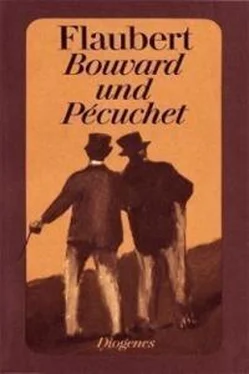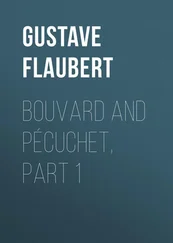Next day, at dawn, with a mattock and a pick, they made an attack on their fossil, whose covering cracked. It was an ammonite nodosus, corroded at the ends but weighing quite six pounds; and in his enthusiasm Pécuchet exclaimed:
"We cannot do less than present it to Dumouchel!"
They next chanced upon sponges, lampshells, orks—but no alligator. In default of it, they were hoping to get the backbone of a hippopotamus or an ichthyosaurus, the bones of any animals whatever that were contemporaneous with the Deluge, when they discovered against the cliff, at a man's height, outlines which assumed the form of a gigantic fish.
They deliberated as to the means by which they could get possession of it. Bouvard would extricate it at the top, while Pécuchet beneath would demolish the rock in order to make it descend gently without spoiling it.
Just as they were taking breath they saw above their heads a custom–house officer in a cloak, who was gesticulating with a commanding air.
"Well! What! Let us alone!" And they went on with their work, Bouvard on the tips of his toes, trapping with his mattock, Pécuchet, with his back bent, digging with his pick.
But the custom–house officer reappeared farther down, in an open space between the rocks, making repeated signals. They treated him with contempt. An oval body bulged out under the thinned soil, and sloped down, was on the point of slipping.
Suddenly another individual, with a sabre, presented himself.
"Your passports?"
It was the field–guard on his rounds, and, at the same instant, the man from the custom–house came up, having hastened through a ravine.
"Take them into custody for me, Père Morin, or the cliff will fall in!"
"It is for a scientific object," replied Pécuchet.
Then a mass of stone fell, grazing them all four so closely that a little more and they were dead men.
When the dust was scattered, they recognised the mast of a ship, which crumbled under the custom–house officer's boot.
Bouvard said with a sigh, "We did no great harm!"
"One should not do anything within the fortification limits," returned the guard.
"In the first place, who are you, in order that I may take out a summons against you?"
Pécuchet refused to give his name, cried out against such injustice.
"Don't argue! follow me!"
As soon as they reached the port a crowd of ragamuffins ran after them. Bouvard, red as a poppy, put on an air of dignity; Pécuchet, exceedingly pale, darted furious looks around; and these two strangers, carrying stones in their pocket–handkerchiefs, did not present a good appearance. Provisionally, they put them up at the inn, whose master on the threshold guarded the entrance. Then the mason came to demand back his tools. They were paying him for them, and still there were incidental expenses!—and the field–guard did not come back! Wherefore? At last, a gentleman, who wore the cross of the Legion of Honour, set them free, and they went away, after giving their Christian names, surnames, and their domicile, with an undertaking on their part to be more circumspect in future.
Besides a passport, they were in need of many things, and before undertaking fresh explorations they consulted the Geological Traveller's Guide , by Boné. It was necessary to have, in the first place, a good soldier's knapsack, then a surveyor's chain, a file, a pair of nippers, a compass, and three hammers, passed into a belt, which is hidden under the frock–coat, and "thus preserves you from that original appearance which one ought to avoid on a journey." As for the stick, Pécuchet freely adopted the tourist's stick, six feet high, with a long iron point. Bouvard preferred the walking–stick umbrella, or many–branched umbrella, the knob of which is removed in order to clasp on the silk, which is kept separately in a little bag. They did not forget strong shoes with gaiters, "two pairs of braces" each "on account of perspiration," and, although one cannot present himself everywhere in a cap, they shrank from the expense of "one of those folding hats, which bear the name of 'Gibus,' their inventor."
The same work gives precepts for conduct: "To know the language of the part of the country you visit": they knew it. "To preserve a modest deportment": this was their custom. "Not to have too much money about you": nothing simpler. Finally, in order to spare yourself embarrassments of all descriptions, it is a good thing to adopt the "description of engineer."
"Well, we will adopt it."
Thus prepared, they began their excursions; were sometimes eight days away, and passed their lives in the open air.
Sometimes they saw, on the banks of the Orne, in a rent, pieces of rock raising their slanting surfaces between some poplar trees and heather; or else they were grieved by meeting, for the entire length of the road, nothing but layers of clay. In the presence of a landscape they admired neither the series of perspectives nor the depth of the backgrounds, nor the undulations of the green surfaces; but that which was not visible to them, the underpart, the earth: and for them every hill was only a fresh proof of the Deluge.
To the Deluge mania succeeded that of erratic blocks. The big stones alone in the fields must come from vanished glaciers, and they searched for moraines and faluns.
They were several times taken for pedlars on account of their equipage; and when they had answered that they were "engineers," a dread seized them—the usurpation of such a title might entail unpleasant consequences.
At the end of each day they panted beneath the weight of their specimens; but they dauntlessly carried them off home with them. They were deposited on the doorsteps, on the stairs, in the bedrooms, in the dining–room, and in the kitchen; and Germaine used to make a hubbub about the quantity of dust. It was no slight task, before pasting on the labels, to know the names of the rocks; the variety of colours and of grain made them confuse argil and marl, granite and gneiss, quartz and limestone.
And the nomenclature plagued them. Why Devonian, Cambrian, Jurassic—as if the portions of the earth designated by these names were not in other places as well as in Devonshire, near Cambridge, and in the Jura? It was impossible to know where you are there. That which is a system for one is for another a stratum, for a third a mere layer. The plates of the layers get intermingled and entangled in one another; but Omalius d'Halloy warns you not to believe in geological divisions.
This statement was a relief to them; and when they had seen coral limestones in the plain of Caen, phillades at Balleroy, kaolin at St. Blaise, and oolite everywhere, and searched for coal at Cartigny and for mercury at Chapelle–en–Juger, near St. Lô, they decided on a longer excursion: a journey to Havre, to study the fire–resisting quartz and the clay of Kimmeridge.
As soon as they had stepped out of the packet–boat they asked what road led under the lighthouses.
Landslips blocked up the way; it was dangerous to venture along it.
A man who let out vehicles accosted them, and offered them drives around the neighbourhood—Ingouville, Octeville, Fécamp, Lillebonne, "Rome, if it was necessary."
His charges were preposterous, but the name of Falaise had struck them. By turning off the main road a little, they could see Étretat, and they took the coach that started from Fécamp to go to the farthest point first.
In the vehicle Bouvard and Pécuchet had a conversation with three peasants, two old women, and a seminarist, and did not hesitate to style themselves engineers.
They stopped in front of the bay. They gained the cliff, and five minutes after, rubbed up against it to avoid a big pool of water which was advancing like a gulf stream in the middle of the sea–shore. Then they saw an archway which opened above a deep grotto; it was sonorous and very bright, like a church, with descending columns and a carpet of sea–wrack all along its stone flooring.
Читать дальше








![Гюстав Флобер - Закат Карфагена [Сборник]](/books/414440/gyustav-flober-zakat-karfagena-sbornik-thumb.webp)


